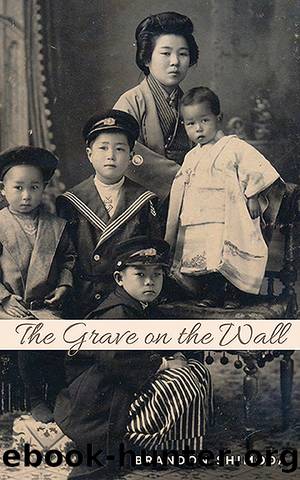The Grave on the Wall by Brandon Shimoda

Author:Brandon Shimoda
Language: eng
Format: epub
Publisher: City Lights Publishers
Their voices were plangent, definitive. They sounded like they were delivering soliloquies at the edge of a cliff. I thought of the young boy standing up to the spirits of the peach orchard in Kurosawaâs dream (I can buy peaches at the store! But where can you buy a whole orchard in bloom?) Masahiro and Nanokaâs message was of sorrow and hope, but they were speaking to the ruins. Adults, what can adults provide? What can adults instill in the faithful and faithless alike that the thousands of disappeared and disappearing witnesses cannot? The morning was a ritual, but Masahiro and Nanoka, their voices pitched into the sky beyond the museum, reinforced the fact, by way of the sun and heatâeyes closed, sweating, clenching their fistsâthat we were gathered in a burial ground. It was as if they were saying: if we understand, if we are courageous enough to raise our voices above the bodies of the dead . . .
The basement auditorium of the Memorial Museum was full, but during the intermission between Japanese and English, it emptied, and only a small number of people remained. Ten westerners, Americans mostly, moved to the front to listen to five hibakushaâtwo women, three menâshare their stories. I opened my notebook and wrote down as much as I could, because I knew I wantedâthat I would continue to wantâto return, every year, to their stories, to what they had come such an extraordinary distance to share.
Keiko was eight at the time of the bomb. She spoke the longest. Her story began with a refusal. People were dying all around herâburning, thirsty, in need of water. She gave them water from the family well. They drank the water, vomited, died. She knew she did not kill them but felt, it was me! It was easier for Keiko to take responsibility for their deaths than to try to explain what she could not. Her story began when she decided she was never going to tell anyone. She called it her invisible scar.
Isao was thirteen at the time of the bomb. Shoso and Keijiro were sixteen. Sumiko was seventeen. Shoso said he hated America. He took our hands in his and thanked us for being there. I felt in his hands the burden of his hatred yet saw on his face the complexity of his hatred being unresolved, solicitous, open.
Shoso Hirai (16)
My father and younger brother were killed instantly . . . My older brothers were in China as soldiers . . . But the air raid alarm was soon cancelled . . . As soon as I touched the door, I was hit by a strong blast . . . It became dark all around me . . . Every path that led to my house was engulfed in flames . . . I thought, There must have been a big disaster in Hiroshima . . . We spent the night at the farmerâs house . . . It seemed as if we had just walked through the Gate of Hell .
Download
This site does not store any files on its server. We only index and link to content provided by other sites. Please contact the content providers to delete copyright contents if any and email us, we'll remove relevant links or contents immediately.
Machine Learning at Scale with H2O by Gregory Keys | David Whiting(4292)
Never by Ken Follett(3937)
Harry Potter and the Goblet Of Fire by J.K. Rowling(3848)
Unfinished: A Memoir by Priyanka Chopra Jonas(3379)
Fairy Tale by Stephen King(3369)
The Man Who Died Twice by Richard Osman(3070)
Will by Will Smith(2906)
Rationality by Steven Pinker(2351)
It Starts With Us (It Ends with Us #2) by Colleen Hoover(2339)
Can't Hurt Me: Master Your Mind and Defy the Odds - Clean Edition by David Goggins(2320)
The Dark Hours by Michael Connelly(2300)
The Storyteller by Dave Grohl(2228)
Friends, Lovers, and the Big Terrible Thing by Matthew Perry(2219)
The Becoming by Nora Roberts(2188)
The Dawn of Everything: A New History of Humanity by David Graeber & David Wengrow(2187)
The Stranger in the Lifeboat by Mitch Albom(2113)
Cloud Cuckoo Land by Anthony Doerr(2098)
Love on the Brain by Ali Hazelwood(2059)
Einstein: His Life and Universe by Walter Isaacson(2009)
